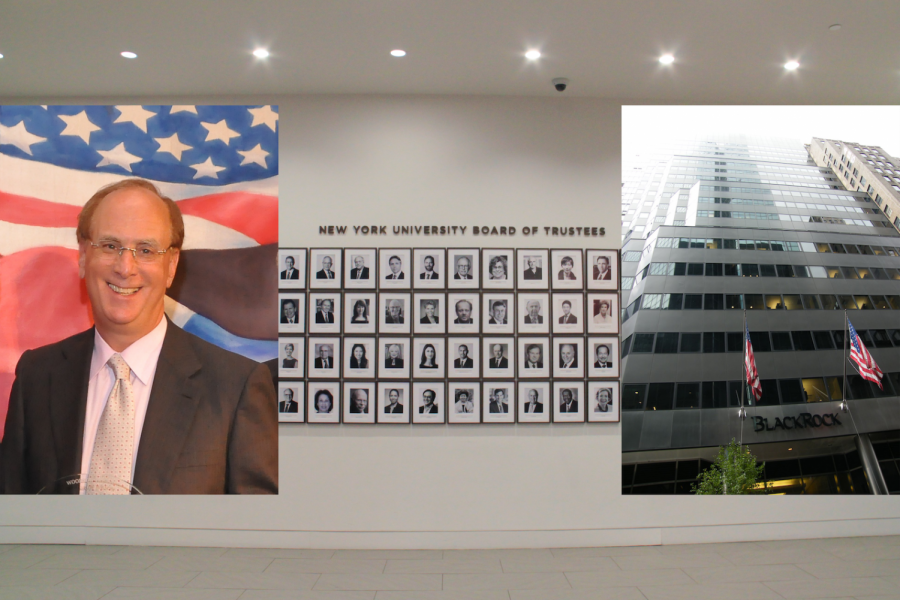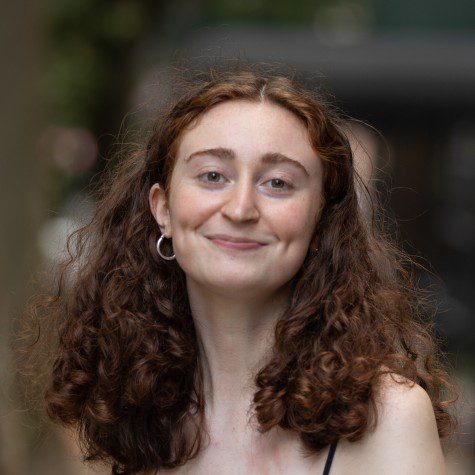‘Larry Fink should not be on the Board of Trustees’: Long-time NYU trustee is linked to ICE and private prison operators
Laurence Fink — the CEO of BlackRock, a vice chair of the NYU Board of Trustees and the co-chair of the NYU Langone Health Board of Trustees — has investments in the U.S-Mexico border wall and immigrant detention facilities.
NYU students and faculty members call for the removal of NYU trustee and Blackrock CEO, Laurence Fink, in lieu of his asset management firm’s investments in index funds associated with firms that operate ICE detention centers and the Trump border walls. (Staff Illustration by Alexandra Chan)
May 5, 2021
Campus access for U.S. Immigration and Customs Enforcement and U.S. Customs and Border Protection agents has been a point of contention during contract renewal negotiations between NYU and the Graduate Student Organizing Committee. NYU claims it does not voluntarily provide information to governmental agencies that would endanger undocumented members of the university community. But the university has stopped short of adopting GSOC’s proposal to end warrantless campus access for ICE and CBP agents.
NYU has criticized ICE and the agency’s rules regarding international students and their visas; however, a member of university leadership is the CEO of one of the largest shareholders in the two largest private prison operators in the United States.
Laurence D. Fink, a vice chair of NYU’s Board of Trustees and co-chair of the NYU Langone Medical Center Board of Trustees, is the founder, chairman and CEO of BlackRock, Inc., an investment management corporation and the largest asset manager in the world. BlackRock holds extensive investments in operators of private prisons and construction companies building the U.S.-Mexico border wall.
BlackRock is the largest shareholder in CoreCivic and the second-largest shareholder in the GEO Group, publicly traded companies that own and operate prisons, jails and ICE detention centers across the country and around the world. It is also the largest shareholder in Sterling Construction Company Inc., which was contracted by the federal government to construct parts of the border wall. BlackRock currently owns 15.41% of CoreCivic and 14.71% of GEO Group, amounting to over $279 million in invested capital, and 7.23% of Sterling, amounting to nearly $38.5 million.
BlackRock claims that while it acts as a broker between its clients and their investments, it does not always have control over where these investments are placed — particularly in the case of index funds, which are sold as packages.
“BlackRock does not select or choose the stocks that third-party index providers include in the benchmarks they create,” a spokesperson for BlackRock wrote to WSN in an email. “Every dollar that BlackRock manages belongs to our clients, and more than 90% of our equity assets are invested in index-based funds that our clients choose. We cannot selectively divest from individual companies in indexes.”
Michael Lustig, an adjunct professor of finance at Stern, worked at BlackRock for most of his 25-year Wall Street career. Lustig proposed that BlackRock could instead buy environmental, social and governance funds to avoid investing in certain companies.
“BlackRock would proportionally sell all of the holdings in those funds, including GEO Group and CoreCivic,” Lustig said regarding index funds that include private prison operators. “Frankly, the day that this becomes a large-scale trend is still a bit far off.”
In recent years, campaigns and grassroots movements calling for banks and corporations to cut ties with the private prison and immigrant detention industries — such as CPD Action, Corporate Backers of Hate, Families Belong Together and Make the Road New York — have achieved most of their demands.
Ben Wolcott, the manager of evaluation and research at Make the Road New York, told WSN that eight banks — JPMorgan Chase, Wells Fargo, Bank of America, SunTrust, BNP Paribas, Fifth Third Bancorp, Barclays and PNC — have committed to stop financing private detention centers. The banks represented an estimated $2.35 billion — or 87.4% — of known credit lines and term loans for CoreCivic’s and the GEO Group’s operations. In mid-April, however, Barclays was kicked out of the American Sustainable Business Council after underwriting municipal bonds for two prisons in Alabama owned by CoreCivic.
“The future shouldn’t include profiting from caging immigrants,” Wolcott said. “There are a lot of parts to how the system needs financing from companies like BlackRock to continue moving. There would be fewer abuses if detention facilities weren’t run by private companies.”
When former President Donald Trump was elected in 2016 with a law and order agenda and zero tolerance immigration policy, the number of shares in private prison operators owned by BlackRock, JP Morgan Chase and Wells Fargo increased 28.3 times. After the Trump administration expanded the immigration detention network, privately operated detention facilities faced an increase in public opposition and potential shut downs by state legislatures.
In January, President Joe Biden ordered the Department of Justice to end its renewal of contracts with privately operated prisons. The executive order, however, does not apply to contracts with separate agencies, such as ICE. Without support from remaining financiers, Wolcott believes it would not be long until private prisons run out of funds.
“BlackRock is one of the major players left at this point, so it’s really important that they shift their policies,” Wolcott said. “The system needs the financing to continue moving.”
Sally Guttmacher, a professor emeritus of Global Public Health, said NYU should not support private prisons and should evaluate who sits on its boards of trustees.
“There’s a clash there between being supportive of human rights and financial stability,” Guttmacher said. “NYU puts people on the Board of Trustees because they’re wealthy and can give money to NYU. A university should be supportive of human rights and be a role model for students who go to that university.”
Guttmacher is one of many NYU faculty members who signed a 2019 letter by the MoMA Divest Campaign, which demanded that Fink — who sits on the Museum of Modern Art’s Board of Trustees — divest all assets from CoreCivic and the GEO Group and relocate funds towards local and global community-oriented programs.
“With over $2 billion in contracts with Immigration and Customs Enforcement, these companies have been responsible for 70% of all immigration detention including children and families jailed at the border as well as in the interior,” the letter reads. “Prison companies are a part of the racist state-sanctioned carceral system of the U.S., which has made the country the largest jailer in the world, placing a massively disproportionate number of black and brown people behind bars.”
University Spokesperson John Beckman did not respond to WSN’s requests for comment. Wolcott believes NYU and other universities should be educating students rather than profiting from immigrant detention.
“Financiers like Larry Fink should not be on the Board of Trustees at NYU,” Wolcott said. “NYU is giving credibility to this tactic, saying not only is it OK to be profiting from immigrant detention, but we want to celebrate people like Larry Fink.”
Email Rachel Cohen at [email protected].

























































































































































